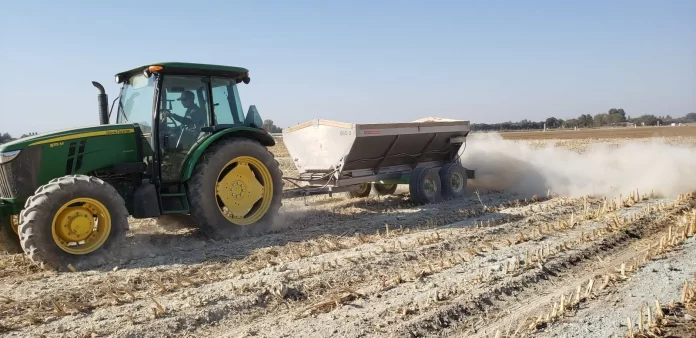Researchers believe that adding basalt dust to soil could help remove a large amount of carbon dioxide from the air
Spotted: Researchers at the University of Sheffield have published a study in the journal Nature that demonstrates how adding crushed rock to farmland could lead to a significant reduction in atmospheric carbon.
The research, led by the university’s Leverhulme Centre for Climate Change Mitigation, examined a technique known as enhanced rock weathering. This involves spreading finely crushed volcanic basalt onto fields in order to boost the soil’s ability to extract carbon dioxide from the air.
In natural rock weathering, slightly acidic rainwater, which has absorbed CO2 from the atmosphere, reacts with the rocks and soils it lands on, gradually breaking them down and forming bicarbonate.
This bicarbonate eventually washes into the oceans, where the carbon is stored. Enhanced weathering speeds up this process through finely ground silicate rock, such as basalt, spread onto cropland. This speeds up chemical reactions that store the CO2 as bicarbonate.
Along with helping to remove CO2 from the atmosphere, enhanced weathering can help counteract ocean acidification by speeding up the addition of alkaline carbonate. Adding the pulverised rock to soils has also been shown to boost soil nutrient levels, increasing crop yields.
The study showed that enhanced weathering could allow China, the US, and India—the highest CO2 emitters—to remove around 1 billion tonnes of CO2 from the atmosphere, at a cost of around $80-180 (around €77 to €172) per tonne of CO2. This is comparable to other proposed carbon dioxide removal strategies.
Another advantage of this method is that it does not require much in the way of new technology or additional expenses. Calcium-rich silicate is readily available as a by-product of iron and steel manufacturing, and as waste cement from the construction and demolition industries.
READ ALSO: Stoning Of Devil in Hajj and its American connection
Professor Steven Banwart, a partner in the study and Director of the Global Food and Environment Institute, explained that, “The practice of spreading crushed rock to improve soil pH is commonplace in many agricultural regions worldwide. The technology and infrastructure already exist to adapt these practices to utilise basalt rock dust.”
There is now a realisation that meeting the Paris climate targets is likely to require removing carbon from the atmosphere, as well as cutting down on the amounts emitted in the first place.
As this realisation has grown, so too have the number of innovations aimed at achieving this. Recently, we have seen a host of new developments in areas such as ‘ocean assisted’ carbon capture and the use of waste plastic in carbon capture.














